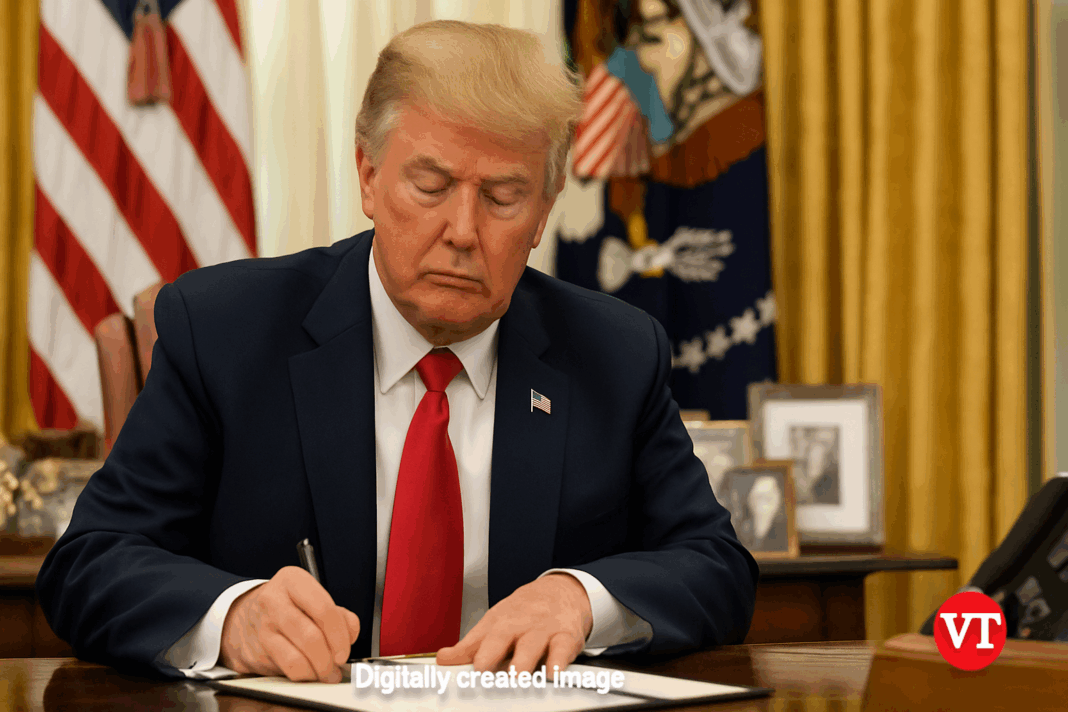Highlights:
- President Trump signed a June 4 proclamation restricting entry from 19 countries over security concerns.
- 12 countries face full entry suspensions, including Afghanistan, Iran, and Somalia.
- 7 others—including Cuba, Laos, and Venezuela—face partial suspensions with visa restrictions.
- The order cites high visa overstay rates, terrorism support, and lack of information-sharing protocols.
- Some humanitarian and government-related exceptions are permitted.
President Donald Trump on Wednesday signed a proclamation that bars citizens from a dozen countries from entering the United States, and restricted access to the U.S. for another seven countries.
“The United States must ensure that admitted aliens do not bear hostile attitudes toward its citizens, institutions, or national values,” Trump stated in the proclamation. He emphasized the need for improved vetting systems abroad and declared that unrestricted entry from these nations poses an “unacceptable risk” to national interests.
Background and Risk Assessment
The proclamation follows a detailed report submitted to the White House in April by the Secretaries of State, Homeland Security, and the Attorney General, in coordination with U.S. intelligence agencies. The report identified countries with severe deficiencies in identity management, information sharing, and cooperation in repatriation of deportable nationals.
According to Department of Homeland Security’s FY2023 Overstay Report, nations such as Chad (49.5%), Burma (27%), and Equatorial Guinea (70%) have exhibited dangerously high visa overstay rates. Meanwhile, Iran and Cuba remain on the U.S. list of state sponsors of terrorism, further compounding their security classification.
Countries Affected by Full Suspensions
The following countries face a full suspension of entry into the U.S. for both immigrants and nonimmigrants:
- Afghanistan
- Burma
- Chad
- Republic of the Congo
- Equatorial Guinea
- Eritrea
- Haiti
- Iran
- Libya
- Somalia
- Sudan
- Yemen
Countries Facing Partial Restrictions
Partial suspensions apply to immigrant visas and select nonimmigrant categories (e.g., B1/B2, F, M, J) from:
- Burundi
- Cuba
- Laos
- Sierra Leone
- Togo
- Turkmenistan
- Venezuela
Exceptions and Waivers
The proclamation includes notable exceptions. Lawful permanent residents, dual nationals using non-designated country passports, and individuals traveling on certain diplomatic and athletic visas are excluded. Specific humanitarian exemptions apply to Afghan and Iranian minority immigrants, adoptees, and U.S. government special visa categories.
Case-by-case waivers may also be issued by the Attorney General or Secretary of State if entry serves critical U.S. interests, such as legal proceedings or national defense.
– President Donald J. Trump, June 4, 2025
Implementation Timeline
The proclamation takes effect at 12:01 AM EDT on June 9, 2025. Visas already issued prior to this date remain valid and will not be revoked, and the order does not affect asylum seekers or those granted refugee or CAT protections.
Legal and Structural Considerations
The proclamation invokes authority under Section 212(f) and 215(a) of the Immigration and Nationality Act, as well as 3 U.S.C. § 301. It includes a severability clause to maintain enforceability even if parts of the order are challenged or invalidated by courts.
While the order affirms it does not create enforceable legal rights, it mandates coordination across federal departments for full execution and encourages legislative engagement for long-term immigration system reform.
Also Read:
- Trump Administration Proposes Rule to Fast-Track Firing of Federal Workers for Misconduct
- Ukraine-Russia Peace Talks Overshadowed by Drone Strikes
Source: White House Presidential Actions – June 4, 2025 Proclamation
A global media for the latest news, entertainment, music fashion, and more.















